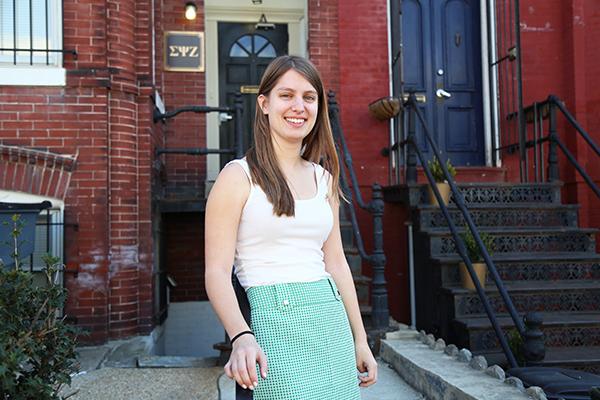Greek life could keep growing on campus.
The leaders of the three Greek councils on campus – the Interfraternity Council, the Panhellenic Association and the Multicultural Greek Council – hope to each add one to three chapters by 2018.
Currently there are 13 fraternities, 10 sororities and 15 multicultural Greek chapters on campus. Delta Sigma Phi, the newest fraternity at GW, joined campus this past fall after more than half of the students who signed up for rush ended up not joining a fraternity. The Panhellenic Association formed a committee earlier this semester to determine if GW needs more sororities to accommodate a larger number of students participating in the recruitment process.
Clare Lewis, the president of the Multicultural Greek Council, said the council has already completed the approval process for three chapters this semester. GW has approved Phi Beta Sigma, a social service fraternity, Alpha Phi Alpha, an African-American fraternity and Sigma Sigma Rho, a South Asian sorority, she said.
“With more members, more people can both contribute to improving MGC, and more people in MGC also means more widespread knowledge of what MGC is in the general student body,” Lewis said in an email. “Different cultures that these organizations represent we may not have represented yet.”
The IFC also hopes to expand so it can offer bids to a larger percentage of men who rush, IFC President Brandon Capece said. Capece said that last fall just 48 percent of rushees were offered a spot in a fraternity.
Capece said new fraternities can “create opportunities for people who never considered joining a fraternity before.”
Tim Miller, the associate dean of students, said the IFC is also “looking into” expansion after what he called the successful integration of Delta Sigma Phi.
“They’ve actually been a great change and addition to this campus. Existing groups are looking at this and saying, ‘Wow, a new group has a different approach to this,’” he said.
Miller added that expansion may help students find the right fit: He said the majority of students who rush fraternities don’t end up receiving a bid.
“For me, you do expansion because you want every man or woman that wants to be in a group to have that opportunity,” Miller said. “So if you have 400 people come out and only 200 join a group because only 200 were offered bids, there are 200 people that didn’t get the opportunity that they wanted.”
Representatives from Delta Sigma Phi’s national organization visited campus earlier this year to spend six weeks recruiting new members. They also met with sororities to ask for names of men that might be a good fit.
Delta Sigma Phi President David Sullivan said the fraternity is still a colony at GW, meaning it doesn’t have a charter, but members hope to establish it further.
“It’s just getting our feet under us and learning how to be a fraternity. It’s all of those things that you take for granted when you’re an organization that just happens naturally,” he said.
Two chapters, Tau Kappa Epsilon and Alpha Epsilon Pi, were shut down within the last two years.
The Panhellenic Association hopes to use expansion to shrink the size of each chapter’s pledge class while still offering more bids.
Panhellenic Association President Rebecca Connolly said in January that the group wanted to add two chapters to campus. Connolly was unable to comment for this story.
Delta Gamma was shut down by its national organization in the fall.
The planned expansion also comes as the number of Greek housing options decreases. There will be two housing options for Greek chapters on campus next fall: a townhouse or Strong Hall, although chapters do not necessarily receive GW housing for their organization. Officials announced in January that Greek chapters will no longer be housed in International House next academic year, citing behavioral issues.
Miller said new Greek groups might not have housing right away, adding that there shouldn’t be an assumption that all chapters get housing.
“Some of our strongest groups over the years have gotten weaker once they got a house and others vice versa,” he said. “So I think housing is not a requirement to be a strong Greek organization, and it doesn’t lead to being a strong Greek organization.”
Natalie Maher contributed reporting.







